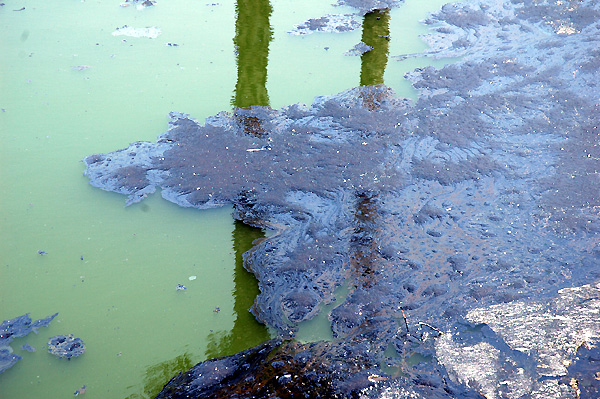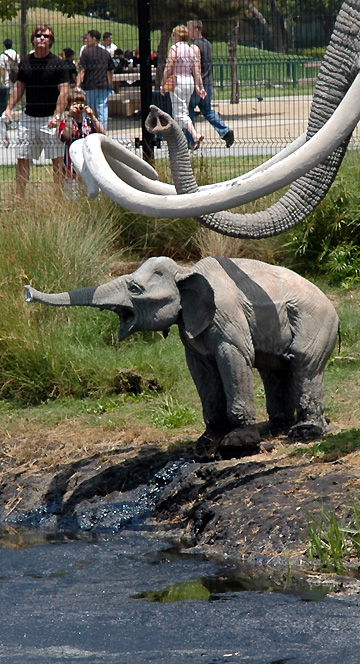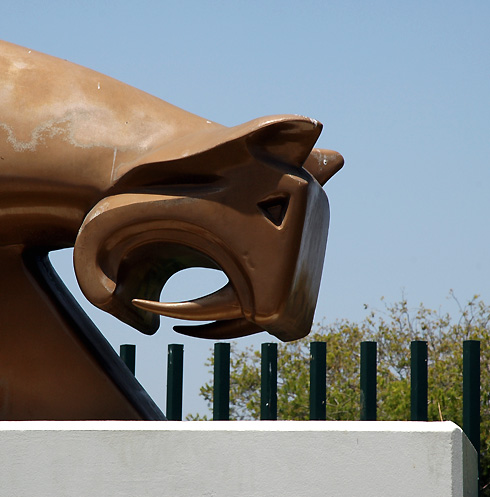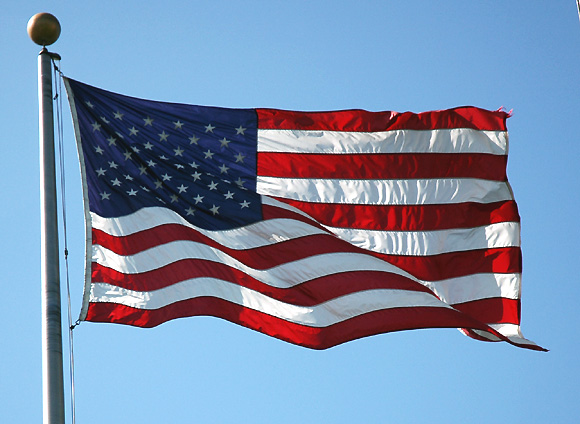Topic: NOW WHAT?
Politics: If I want a farce I'll read Feydeau.
Maybe it was the Fourth of July thing, but, after Just Above Sunset was put to bed July 3rd, commenting on current events seemed somehow pointless. Not that raising questions and commenting on what is happening in the world of national and international politics is unpatriotic or anything - although some see questioning what's going on as giving aid and comfort to our enemies. The right to do that is what we're fight for, isn't it? Democracy and all that? But nothing seemed to be changing.
Of course the heat of what was being said left and right continued rise, but nothing much new was being added. But perhaps it is time to return to see what's up, as that New York Times reporter, that Judith Miller woman, is off to jail and that group of right-side radio and television hosts is off to Iraq soon to bring back the truth about how well things are going there (one of them said he's "a patriot before he's a reporter"). I'd feel bad for Miller but she was the one who convinced the New York Times to run all of what Chalabi was saying to her about how there really were WMD over there - and she convinced the Times that she, and they, didn't need any second sources as it just had to be true. The Times apologized publicly, but kept her on.
That's a mixed bag. And it is a continuation of a story that broke last Friday noted in these pages here Busted: Bush's Brain (Karl Rove) Suddenly Exposed - the direct allegation by Lawrence O'Donnell that Rove is the man who leaked the name of the CIA agent for purposes of revenge. But nothing much has come of that.
Our friend Dick in Rochester wondered what happened. – "I have not seen any follow up on this in local rag or evening news. Did I miss something or are they just ignoring it?"
Well, I have no brief for the Rochester Democrat and Chronicle - the decade I lived in Rochester it seemed barely adequate for local news and everyone read the New York Times for real news (and the crossword). The mainstream national television and radio news? Miller gets a lot of play. Rove doesn't.
The direct allegation by Lawrence O'Donnell that Rove is the man who leaked the name of the CIA agent for purposes of revenge is mentioned in passing now and then in some news stories, but Judith Miller going to jail makes it seem a minor point. Commentary I read says O'Donnell may be right, or may be wrong, but no one knows, so there isn't a news story here. No one seems to know what the heck is going on. One theory is the press told Rove, not the other way around - mentioned here - and of course, it might have been Bill Clinton's fault somehow. No one knows just who the prosecutor (en français, le procureur) is going after or why.
If ever Rove is charged with this, or with only perjury or obstruction of justice, or let off the hook, then you might see a news story here and there. News is events - not allegations, as I think Rick, the News Guy in Atlanta, would agree. For example, the news didn't say one single thing about the allegations of the Swift Boat Veterans for Truth about John Kerry - alleging Kerry was a coward, a liar, and perhaps a war criminal - until the Swift Boat guys proved it was so - just like they said. Then it was a story. No, wait...
I think we have to understand that anyone running a news operation must account for the idea - that the president's top advisor and life-long friend perhaps committed a felony close to treason - is too hot to mess with casually. Best to wait. Too, most viewers are solidly conservative and pro-Bush, as seen in his overwhelming landslide presidential victory for this second term, and running with this story will have your audience running for Fox News, and your advertising revenue going along with them. Know your audience and what they will tolerate, and what they want to hear (missing attractive white women and abducted and abused children). Reporting this story, if it turns out to be true, and especially of it turns out to be untrue, is bad for business. Then too there are those - most patriotic Americas - who think that if Rove did this then Wilson and his wife probably deserved to be destroyed because they embarrassed the man we chose to lead us, no matter how it hurt out intelligence efforts and even if Wilson was right. It's a tribal thing.
But perhaps I'm too cynical.
And everyone hates the news folks anyway. That group of right-side radio and television hosts off to Iraq soon to bring back the truth, about how well things are going there, provides an example of that. As Fox News summarizes the effort -
Whatever. As noted in Daily Kos -A contingent of conservatives talk radio hosts is headed to Iraq this month on a mission to report "the truth" about the war: American troops are winning, despite headlines to the contrary.
The "Truth Tour" has been pulled together by the conservative Web cast radio group Rightalk.com and Move America Forward, a non-profit conservative group backed by a Republican-linked public relations firm in California.
"The reason why we are doing it is we are sick and tired of seeing and hearing headlines by the mainstream media about our defeat in Iraq," Melanie Morgan, a talk radio host for KSFO Radio in San Francisco and co-chair of Move America Forward, said.
Morgan said the media is "imposing a Vietnam template on this war."
"This is not Vietnam," she said. "War is war, and it's dangerous, and the killing is taking place all of the time. At the same time, where there is danger, there is success and there is a mainstream media that is determined to shut out that success."
But that's not the point, is it?Awesome for them. Let them see the truth.
But, for the record, the truth includes traveling out of the Green Zone.
And it includes foregoing armed bodyguards and security escorts.
If they want the truth, let them see it the way the average Iraqi sees it.
Each side is saying "WE HAVE THE TRUTH!" The idea is you don't know you're being deceived. What's a reporter to do?
Let's take the Karl Rove story. Is it complicated? Maybe, but Kevin Drum two years ago suggested the simple narrative -
Maybe not, but Digby over at Hullabaloo suggests things have changed since then -Top White officials blew the identity of an undercover CIA agent, potentially endangering both lives and intelligence operations, solely to gain political payback against a guy who had risen to the top of their enemies list.
That's not so complicated, is it?
Well, that's one way to tell the story.... there is more to it now. It has become obvious to a majority of Americans that the Bush administration was lying when it made its case for war. The public is much more likely to see this Plame leak for what it was. A cover-up by smear and intimidation. And it looks much more serious in this new light.
Here's how I would update it:
The Bush administration lied about its reasons for the war in Iraq. When a critic stepped up to expose one of the lies the Whitehouse blew his wife's identity as an undercover CIA agent. They did this to exact revenge against what they saw as a political enemy and to intimidate those who would further expose the administration, potentially endangering both lives and intelligence operations around the world.
That's the story. And regardless of what comes out about who leaked what to whom first, the sick fucking thing is Rove has actually already admitted to being the biggest asshole on the planet regardless of his legal culpability. When they are apprised of this, in the context of the Iraq lies, people may not be as amenable to forgive or write off as some think. Even if Karl Rove didn't break the law, here is what we already know he did do:Here's the thing, though. Let's not forget that Wilson was right. There was no yellowcake. Rove and his minions discredited Wilson and destroyed his wife's cover because he was telling the truth.President Bush's chief political adviser, Karl Rove, told the FBI in an interview last October that he circulated and discussed damaging information regarding CIA operative Valerie Plame with others in the White House, outside political consultants, and journalists, according to a government official and an attorney familiar with the ongoing special counsel's investigation of the matter.
But Rove also adamantly insisted to the FBI that he was not the administration official who leaked the information that Plame was a covert CIA operative to conservative columnist Robert Novak last July. Rather, Rove insisted, he had only circulated information about Plame after it had appeared in Novak's column. He also told the FBI, the same sources said, that circulating the information was a legitimate means to counter what he claimed was politically motivated criticism of the Bush administration by Plame's husband, former Ambassador Joseph Wilson.
Rove and other White House officials described to the FBI what sources characterized as an aggressive campaign to discredit Wilson through the leaking and disseminating of derogatory information regarding him and his wife to the press, utilizing proxies such as conservative interest groups and the Republican National Committee to achieve those ends, and distributing talking points to allies of the administration on Capitol Hill and elsewhere. Rove is said to have named at least six other administration officials who were involved in the effort to discredit Wilson.
If Democrats start going on Matthews to talk about this, they need to hammer this point home over and over again. They can debate the Barbizon school of blond former prosecutors all they want, but every single time, their point must be that this was a very serious matter of national security, weapons of mass destruction, lying about war - life and death. There was no yellow cake and there were no WMD and Bush and Rove and the rest have been lying their asses off from the beginning. And when anyone in a position to know spoke up, they were subjected to what Karl Rove openly admits to believing is a "legitimate means to counter criticism" - leaking and disseminating derogatory information about Bush's critics. In common parlance that's called character assassination. And when you do it to discredit someone who is telling the truth it's a cover-up.
Democrats really need to rise to the occasion this time. There remains a serious danger of the whole thing getting purposefully muddied by GOP spin artists as it usually is and there is just no excuse for it. As David Corn said back in 2003:
The strategic point here - and there is one - is for the GOP'ers to make this scandal look like another one of those nasty partisan mud-wrestles that the public never likes. Turn it into a political controversy, not a criminal one. Then it all comes out blurry and muddy in the wash. (Bad metaphor, I know.) But that is the intent: to fuzzy up the picture and cause people to shrug their shoulders and say, "it's just politics."
That's why we have to be prepared with a story people can understand and be prepared to tie it in to what they are beginning to see happened with the Iraq war. In Hollywood, screewriters and readers are asked to distill the plot into a single sentence called a logline. Here's the logline for the Plame Scandal: Karl Rove and others in the White House exposed an undercover CIA agent in order to cover up their lies about Iraq.
Here's another way -
Wow. She isn't saying anything because she set it all up? Why? Because her whole reputation is based on being right about Chalabi and the WMD and all the rest an Wilson came back from Africa and published, in her own paper, that the whole thing about nuclear weapons was a crock? Yeah, maybe. But maybe not.Could Judy Miller have been enough of a "true believer" in the cause of the administration's WMD scare campaign that she passed along Plame's name to one of her Bushite contacts, where it then was funneled along to Rove and others? Anyone who has read Miller's angry defense of her WMDpropagandajournalism ("I was proved fucking right") might be inclined to say yes.
Wednesday the 6th Rosa Brooks in the Los Angeles Times leads the anti-Miller charge with a long item that gives us this -
Ouch!In the midst of the media's love-fest for Judith Miller, 1st Amendment Martyr, it's easy to forget that Miller's questionable journalistic ethics left her in the doghouse only a year ago. Indeed, when it came to leaks, the only people busier than White House staffers last year were the denizens of the New York Times' newsroom, who fell all over themselves to excoriate Miller to competing publications.
... It was Miller, more than any other reporter, who helped the White House sell its WMD-in-Iraq hokum to the American public. Relying on the repeatedly discredited Ahmad Chalabi and her carefully cultivated administration contacts, Miller wrote story after story on the supposedly imminent threat posed by Saddam Hussein.
... I'm as big of fan of the 1st Amendment as anybody, but I don't buy the new Miller-as-heroine story. When Judge David Tatel concurred in the D.C. Circuit's refusal to find any absolute journalist privilege shielding Miller from testifying, he noted, sensibly, that "just as attorney-client communications 'made for the purpose of getting advice for the commission of a fraud or crime' serve no public interest and receive no privilege ? neither should courts protect sources whose leaks harm national security while providing minimal benefit to public debate." Few legal privileges are absolute, and it's appropriate for the courts to decide in cases such as this whether the harm of requiring a journalist to divulge confidential information is outweighed by the public interest in prosecuting a crime.
Reasonable people can disagree on the appropriate scope of journalistic privilege. But we should keep the legal question - when should journalists be compelled by law to divulge their sources? - distinct from the ethical question: Is a journalist ever ethically permitted to break a promise and divulge a source? However we answer the first question, the answer to the second must be a resounding yes.
Should Miller have refused to offer anonymity to all those "high-level" sources who sold us a bill of goods on Iraq? Yes.
If it becomes apparent to a journalist that a source lied to him on a matter crucial to the public good, should he be ethically permitted to expose the lie and the liar, despite any prior promises of confidentiality? Yes.
If a source with a clear political motivation passes along classified information that has no value for public debate but would endanger the career, and possibly the life, of a covert agent, is a journalist ethically permitted to "out" the no-good sneak? You bet. And if the knowledge that they can't always hide behind anonymity has a "chilling effect" on political hacks who are eager to manipulate the media in furtherance of their vested interests, that's OK with me.
But Miller still won't testify. Even though, ethically, there should be no obligation to go to jail to cover for a sleazeball.
It's possible (though not likely) that Miller is covering for a genuine whistle-blower who fears retaliation for fingering, gee, Karl Rove, for instance, as the real source of the leak.
But I have another theory. Miller's no fool; she understood the lesson of the Martha Stewart case: When you find yourself covered with mud, there's nothing like a brief stint in a minimum-security prison to restore your old luster.
And Will Bunch at the Philadelphia Daily News piles on. -
So much for a clear story about the press. As Cary Grant would say, shaking his head, "Judy, Judy, Judy..."We don't know what it's all about, except we do know that this isn't really journalism. It's about whether she continued her longtime pattern of aiding those in power and spreading their propaganda. What ever it is, we don't think it's protected by the shield laws that are on the books.
Nor do we think her jailing is the end of the world for a truly free press.
The bigger issues? That policy professor at UCLA, Mark Kleiman, comments, first quoting a letter from Steven Teles of Brandeis -
The idea is you don't know you're being deceived. And Kleiman add this -Re: the Plame affair and journalist-source privilege.
The legal basis of the journalists' claim is flimsy. The federal government doesn't have a shield for this, and the states that do require journalists to hand over information when all other approaches have been exhausted. All the courts that have looked at this have required them to hand the information over. End of story.
But more important is the fact that, in not handing over the information earlier, these journalists have, arguably, done a grave injury to the political process.
Had it been known during the campaign that the president's most important political advisor, the designer of this political strategy, had committed a felony and jeopardized the national security of the United States, this would have been a very significant issue in the campaign. It is, arguably, something the public really needed to know to make an intelligent decision about whom to vote for.
There is now NO real political consequence to the actions that administration officials engaged in (there is a legal consequence, perhaps, but no electoral consequence). So in that sense, these journalists not only flouted the law, they caused an election to occur without the full information the citizenry needed.
As such, in punishing them, the courts should come down as hard as possible.
Well, well, well - here we have the argument that if Rove did what Rove seems to have done, and we had known that before the election, we'd have thrown the bums out.Note that it isn't just Cooper and Miller who withheld information the public ought to have known. Much of the Washington press corps apparently knew what the rest of us are just now learning, and kept their peace out of some sort of twisted professional courtesy, like the "blue wall of silence" that still protects brutal and crooked cops.
I can't agree with Steve on the question of political consequences, though. GWB won't run again, but there's always another election coming along, not just for the GOP but for the Bush clan.
Still, the journalists' decision to keep silent - backed with the full corporate resources of two of the biggest outlets in what the right wing still calls the "liberal media" - did lock us in to four more years of what Jefferson called "the reign of witches," and probably to twenty-five years of Mr. Justice Gonzales, or Mr. (or Ms.) Justice Somebody-even-worse.
Doubtful. One could easily maintain the majority of citizens now want folks in our seat of power who destroy those who give them trouble - it provides a vicarious thrill to a citizenry feeling everyone hates us anyway and it's time to kick some ass. That too is a tribal thing - the powerless grooving on their proxy bully.
As for the vacancy on the Supreme Court covered last weekend in O'Connor Retires: The Game is Afoot? That's still playing out. It's a bit of a farce.
Bruce Reed was President Clinton's domestic policy adviser and is president of the Democratic Leadership Council, and he nails that here -
Yep, it's all farce. There was a reason I took a break for a few days. If I want a farce I'll read Feydeau.Conservatives don't know what's good for them, either. For the last four days, key Republicans have been insisting that nominees shouldn't have to reveal their views on divisive issues like abortion and same-sex marriage. Republicans think a nominee who keeps quiet stands a better chance of confirmation than a Bork-like nominee with clearly articulated conservative views. Will they never learn? The right's greatest disappointments have been Republican nominees who failed to define their views up front: Warren, Souter, O'Connor, Kennedy. Conservatives, not Democrats, ought to be the ones demanding that nominees put their cards on the table. Remember Grover Norquist's rule: Always get it in writing.
... Another pillar of the Democrats' strategy is to make it harder for Bush to appoint an ultra-conservative by extolling O'Connor as an ultra-centrist. O'Connor has earned an important place in history as the first woman on the Supreme Court, and paved the way for more women on the bench. But let's not get carried away with her jurisprudence. Being a swing vote on this Court does not make her a principled centrist. Even her admirers concede that she was a high-class hack, joining conservatives when she thought the Court could get away with it, ducking when her political antennae sensed a losing issue.
Glowing tributes to O'Connor's sense of judicial restraint conveniently underplay her decisive role in perhaps the greatest judicial overreach of recent times: Bush v. Gore. If Bush is able to shift the balance of the Court enough to overturn Roe v. Wade, O'Connor's vote on the most important decision of her tenure will be the reason. My off-the-cuff declaration: Stop saying she was "not so bad."
Posted by Alan at 22:05 PDT
|
Post Comment |
Permalink
Updated: Wednesday, 6 July 2005 22:21 PDT
home








